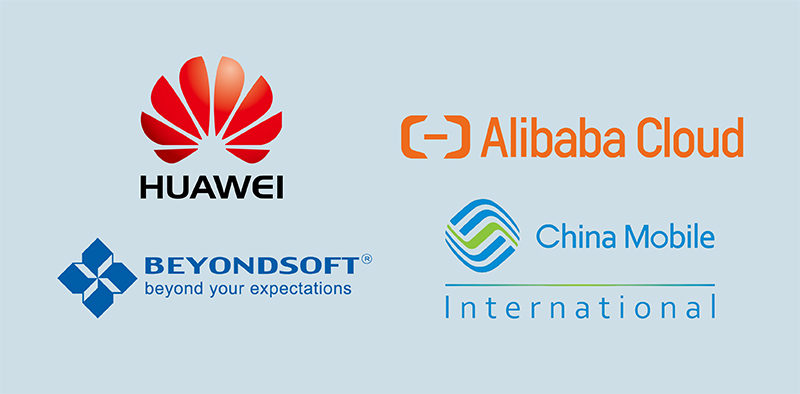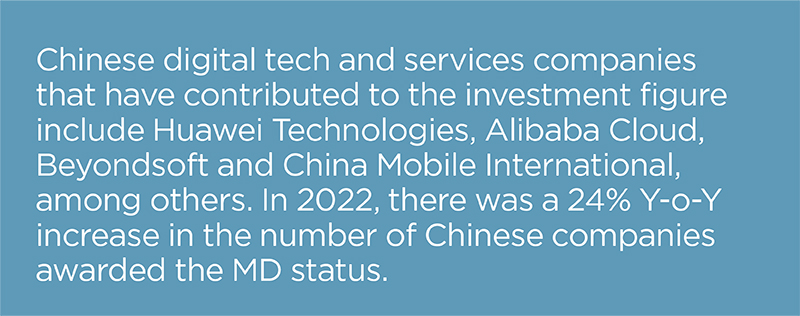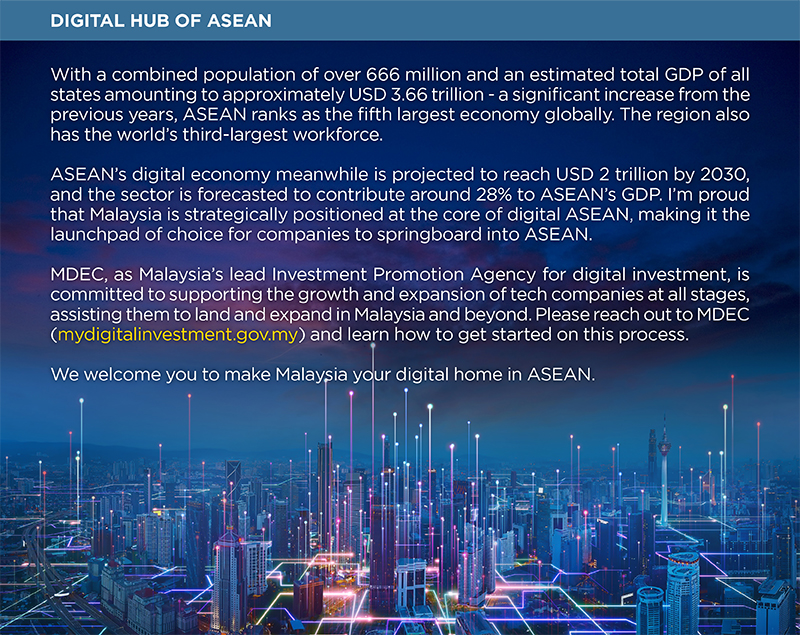Seizing US$2 Trillion Digital ASEAN Opportunities: How China Can Leverage Malaysia’s Advantage
By Raymond Siva, Senior Vice President, Digital Investment, MDEC

It has been 10 years since the Belt and Road Initiative (BRI) was first launched, and in that time, the global business landscape has changed tremendously. Malaysia has long been supportive of the infrastructure development strategy since its inception, with the BRI serving as a catalyst for fostering economic connectivity and forging more robust partnerships across Asia and beyond.
Much has been written about the BRI, including arguments for and against it. What remains however, is the strong trade relationship between Malaysia and China. Malaysia’s Ministry of Investment, Trade and Industry’s Trade & Investment Mission to China from 31 March to 2 April 2023 generated MYR 170 billion (CNY 262.8 billion) of potential FDI from China and MYR 2.44 billion (CNY 3.8 billion) of potential exports to China. Malaysia has also been a major trading gateway in the Digital Silk Road, as the country continues to experience a surge of Chinese capital in the digital economy.
Let’s look at just how far Malaysia and China's relationship has come regarding digital investments.
Malaysia, the Premier Investment Destination
Malaysia has maintained its position as the location of choice for digital tech and services companies from China to land and expand in ASEAN. According to Malaysia Digital Economy Corporation’s (MDEC) records as at the end of 2021, Chinese companies with MSC status have recorded a total investment value of more than MYR 1.3 billion (over CNY 2 billion) into Malaysia. Since July 2022, the MSC status has been revamped to Malaysia Digital (MD).

MD is the new national strategic initiative by the government, building on the strong foundation established via MSC Malaysia - a national initiative established in 1996 towards transforming Malaysia into a leader in the knowledge-based economy. MD aims to encourage and attract companies, talents and investments while enabling Malaysian businesses and its people to play a leading part in the global digital revolution and digital economy.

Driving investments with Malaysia Digital
What makes Malaysia so attractive that more and more such companies are deciding to invest in the country?
Malaysia ranked first in emerging Southeast Asia as the country with the most potential to attract FDI in the Milken Institute’s Global Opportunity Index 2022, and this can in part be attributed to the various initiatives implemented under MD. The MD status offers fiscal and non-fiscal initiatives to local and international tech companies to encourage them to operate, grow, expand, or invest anywhere in the country.
Malaysia is also home to a mature and innovative digital ecosystem and infrastructure on top of being an excellent location for business continuity while companies enjoy the value-driven cost of doing business.
Additionally, MDEC’s Global Testbed Initiative (GTI) enhances Malaysia’s position as a digital technology hub by attracting foreign and local companies to testbed and validate their digital solutions in Malaysia. The objectives of GTI include catalysing high-value activities that align with MD aspirations and establishing a friendly ecosystem for new digital technologies and business models.
Another crucial pull factor is Malaysia’s highly skilled, digitally savvy and multilingual talent pool. This is evident by the country achieving a ranking of third globally in the Graduates in Science & Engineering sub-index in the WIPO Global Innovation Index 2022 and obtaining the fourth spot globally in high-value exports of global knowledge skills according to the INSEAD Global Talent Competitiveness Index 2022. To ensure Malaysia has a robust and sustainable digital talent pipeline to support industry growth, MDEC is championing end-to-end talent and capability initiatives that span across programmes catered to school and tertiary students and the existing workforce. These include the Let's Learn Digital upskilling program, industry-academia collaboration through the Premier Digital Tech Institutions (PDTIs) and the #mydigitalmaker movement to transform Malaysian youth from digital users to producers in the digital economy.
MDEC’s talent initiatives extend over its relationship with China as well - proof of a two-way understanding of the importance of talent. Last year, the Alibaba Netpreneur Training Programme, powered by Alibaba Global Initiatives in partnership with MDEC and Malaysia External Trade Development Corporation (MATRADE), offered entrepreneurs and business owners an opportunity to learn and explore how to harness digital technology to thrive through a four-week online training.
In 2022, to promote digital professional mobility and tourism across Malaysia, MDEC introduced the DE Rantau programme, aimed at establishing Malaysia as the preferred digital nomad hub in ASEAN. Through DE Rantau, foreign and local digital nomads can travel and work remotely across various locations in Malaysia, while having access to stable broadband connectivity and various other facilities and services supporting the nomadic lifestyle.
With the increasing focus on environmental, social and governance (ESG) globally, as part of the commitment to create a sustainable, carbon-neutral digital economy in Malaysia, MDEC developed the Malaysia Digital Climate Action Pledge (MDCAP) to support sustainability adoption by businesses across the digital economy.
A regional data centre hub
Over the recent years, Malaysia has also proven itself to become a regional data centre hub - and for good reasons. Strong domestic and international connectivity, ease of doing business, progressive data governance and the availability of highly reliable energy are key ingredients to the country’s success in attracting data centre players. Availability of land, incentives, strong and growing market demand, and a low incidence of natural disasters add to Malaysia’s appeal. In the Knight Frank SEA-5 Data Centre Opportunity Index 2023, Malaysia has become the most attractive destination for data centre investments.

Developing greater collaboration
The China Plus One strategy also needs to be included in the Malaysia-China investment relationship discussion. Tech companies can now clearly see the potential of Malaysia as an ideal ‘+1’ destination, thus contributing to the FDI inflows into Malaysia, while also fully leveraging existing good relationships with China.
As China and Malaysia forge stronger partnerships, implementing the Regional Comprehensive Economic Partnership (RCEP) opens more opportunities for both nations. The world’s biggest free-trade agreement by population and GDP is expected to eliminate about 90% of the import tariffs between its signatories within 20 years of implementation. Malaysia is also a signatory of the Comprehensive and Progressive Agreement for Trans-Pacific Partnership (CPTPP), and we look forward to China’s active participation in the trade agreement.
With the economic reopening of China post-pandemic and the growing geopolitical tensions between China and the West, a rising number of Chinese businesses are now eyeing the competitive Southeast Asian region for international expansion more keenly.
>




